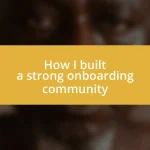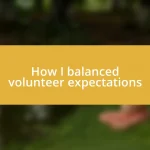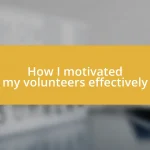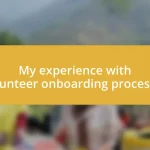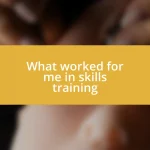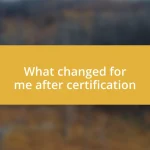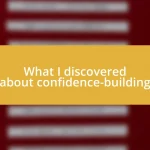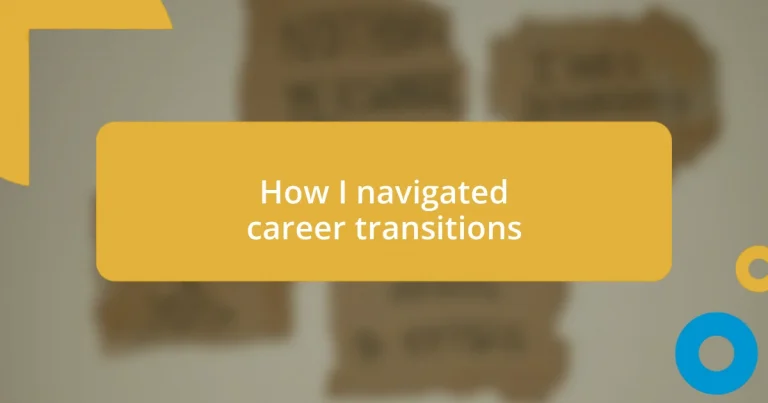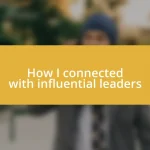Key takeaways:
- Understanding motivations behind career transitions is essential; recognizing unfulfilled passions can reveal new opportunities.
- Identify and showcase transferable skills through storytelling to build connections and highlight your adaptability across industries.
- Continuous learning and reflection are vital for personal growth during transitions, helping adapt to new environments and refine career goals.
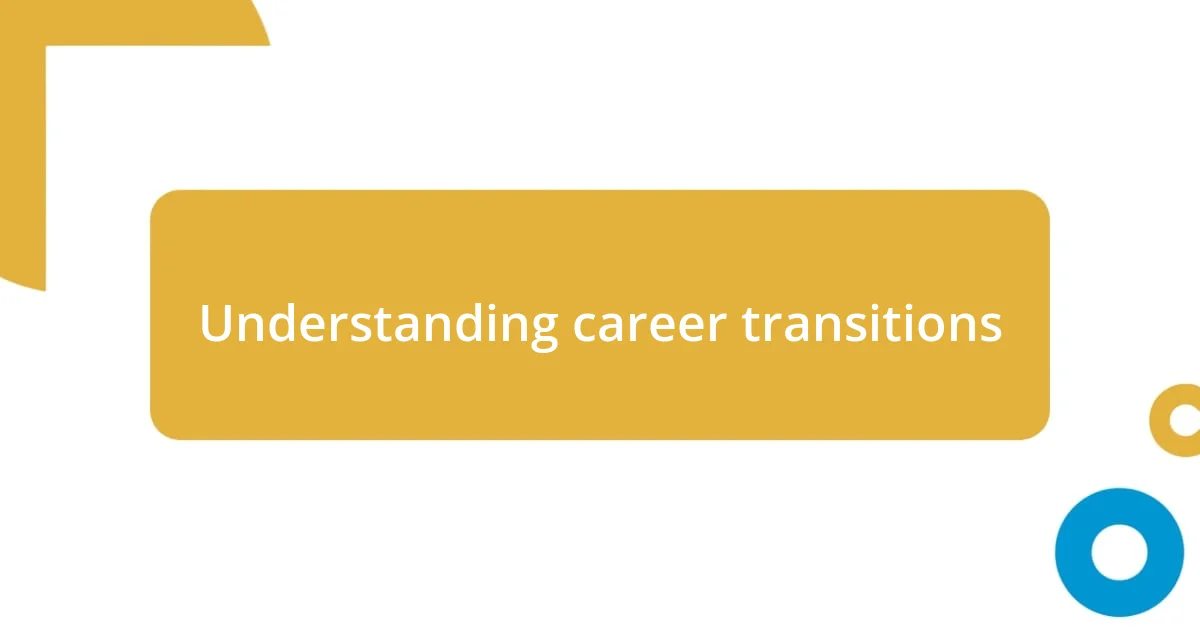
Understanding career transitions
Navigating career transitions is a profoundly personal experience that often stirs up a mix of excitement and anxiety. I remember my own transition vividly; the thrill of pursuing a new passion was contrasted by the nagging fear of the unknown. Isn’t it interesting how embracing change often comes hand in hand with feeling lost?
Throughout my journey, I’ve learned that understanding the underlying motivations for a career shift is crucial. For me, it was the realization that my current path was stifling my creativity. Have you ever found yourself feeling unfulfilled in a position? Reflecting on what truly drives us can illuminate unexpected opportunities waiting just around the corner.
Career transitions can feel like a rollercoaster ride, with highs and lows that challenge our resilience. When I took a leap into a new industry, each setback taught me something valuable about my strengths and weaknesses. Isn’t it empowering to recognize that these challenges shape us into more adaptable individuals? Embracing these ups and downs can make the process less daunting and more transformative.
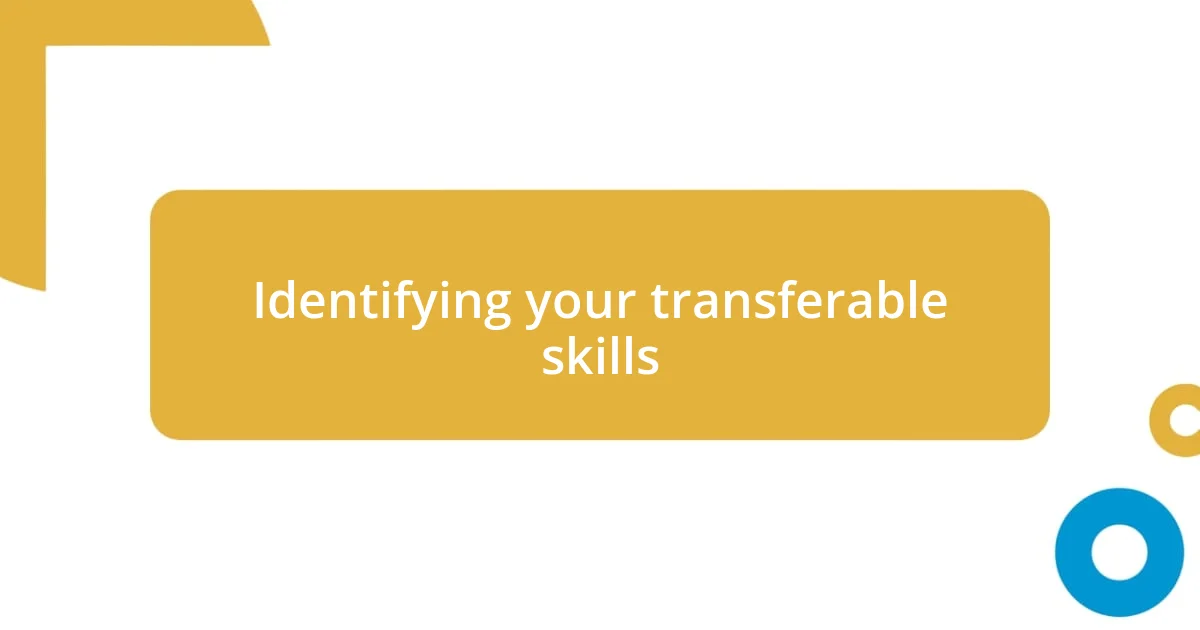
Identifying your transferable skills
Identifying your transferable skills can feel like a treasure hunt—exciting yet overwhelming. I vividly recall when I moved from project management in construction to a role in digital marketing. I found that skills like communication, teamwork, and problem-solving were crucial in both fields. They’re not just relevant; they’re powerful tools that help bridge the gap between different industries.
As I continued my journey, I took a step back to assess my past experiences. You know what surprised me? Skills I didn’t think were significant, like time management and adaptability, became essential during my transition. Reflecting on seemingly small accomplishments allowed me to build a comprehensive skill set that appealed to potential employers across various sectors.
When I started networking after my transition, I was amazed at how often my background in team leadership resonated with others. I realized that showcasing my skills through real-life examples made conversations more engaging. Have you considered how storytelling can highlight your transferable skills? It’s the stories behind our skills that truly connect us with others and reveal the potential hidden within every experience.
| Transferable Skill | Example from Previous Experience |
|---|---|
| Communication | Effectively led team meetings in construction projects, translating technical jargon for varied audiences. |
| Problem-Solving | Developed innovative solutions to project challenges, enhancing team efficiency. |
| Time Management | Successfully managed multiple deadlines while ensuring project milestones were met. |
| Adaptability | Quickly adjusted project plans in response to shifting client demands or unexpected issues. |
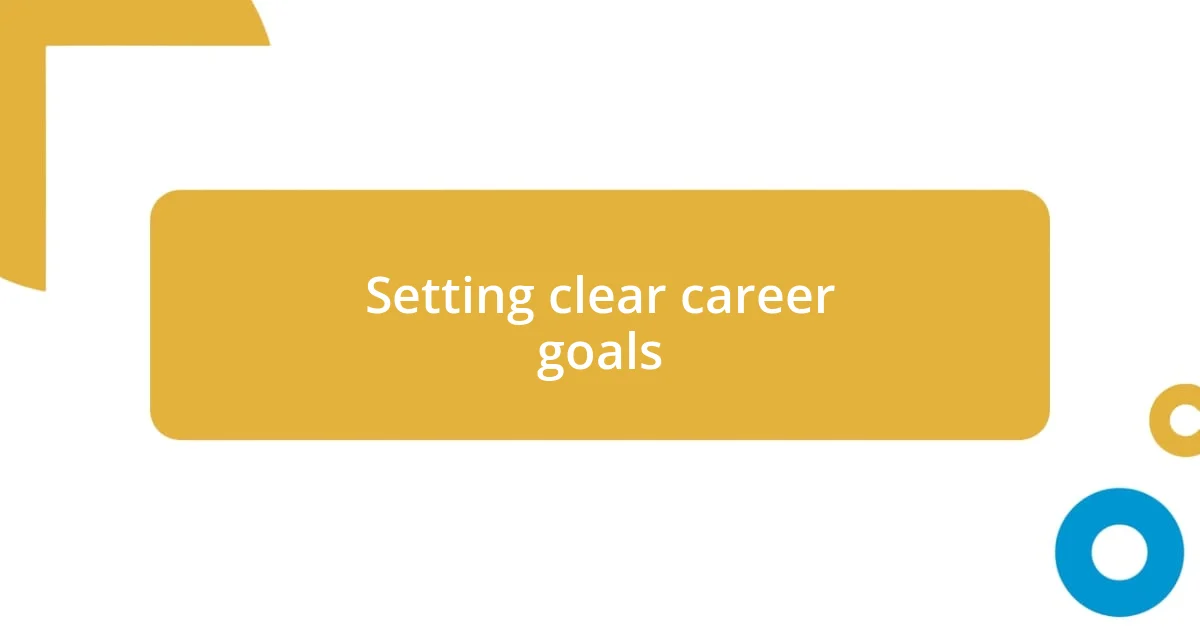
Setting clear career goals
Setting clear career goals is like drawing a roadmap for your journey. I recall sitting down with my thoughts and writing a list of what I truly wanted in my professional life. It was eye-opening! Establishing specific, measurable, achievable, relevant, and time-bound (SMART) goals provided clarity during a time when I felt overwhelmed by choices.
To help you set your own clear goals, consider the following steps:
- Reflect on Your Values: What matters most to you in a job—creativity, stability, or growth?
- Visualize Your Future: Imagine where you want to be in five years. What does that look like?
- Break Down Goals: Instead of vague ambitions, break them into smaller, actionable steps.
- Set Deadlines: Assign realistic timelines for each goal; urgency can create motivation.
- Revisit and Revise: Life changes, and so should your goals. Regularly review your progress and adjust where necessary.
After I established my goals, I felt an exhilarating sense of purpose. For me, achieving those milestones became a rewarding journey rather than just an endpoint. It’s fascinating how clear career intentions can ignite the fire within, allowing us to chase opportunities with renewed passion and confidence.
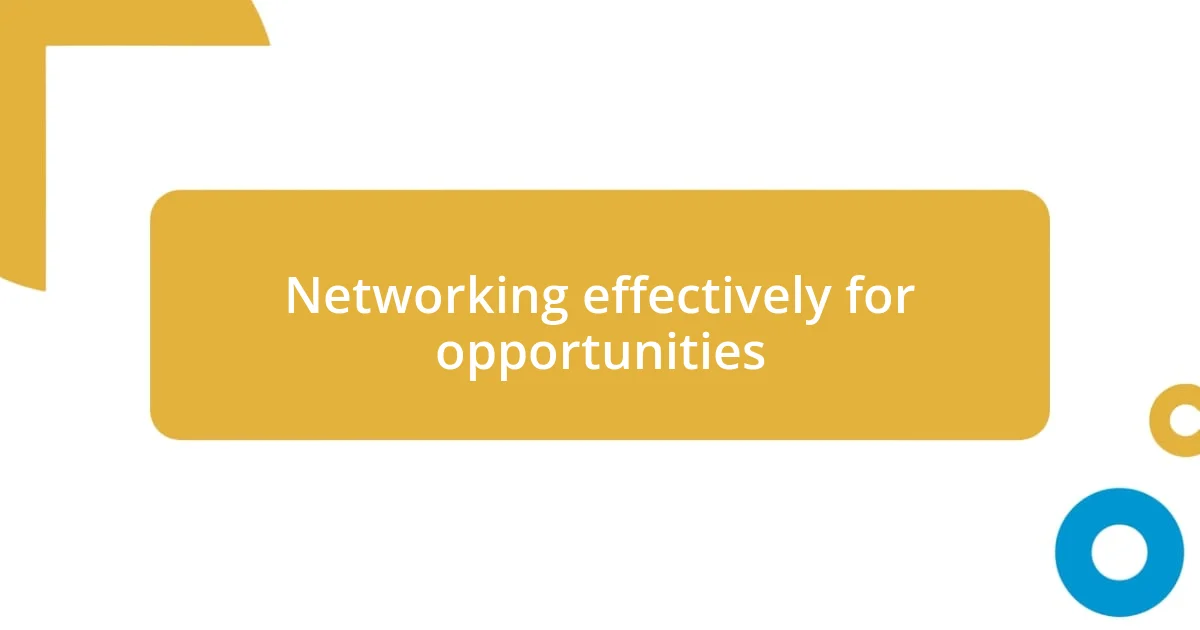
Networking effectively for opportunities
Networking effectively for opportunities is about cultivating genuine relationships, rather than just collecting contacts. I remember attending my first networking event after my transition; I felt a mix of excitement and apprehension. As I approached someone in my target industry, I focused on listening more than talking. This shift in mindset transformed that initial conversation into an engaging dialogue where I not only shared my aspirations but also learned invaluable insights into industry trends—something I never expected from just one chat.
In my experience, following up after these initial encounters is crucial. After that event, I made it a point to send personalized thank-you notes that referenced our conversation. This simple gesture opened the door to further discussions, and over time, it led to job referrals I wouldn’t have predicted. Have you ever thought about how a few thoughtful words can solidify a connection? Trust me, the impact is profound. It’s amazing how these small, sincere actions can make you memorable in a sea of faces.
Additionally, social media has become my compass in navigating opportunities. I found platforms like LinkedIn particularly effective for connecting with those I admired in my field. I often take the time to comment on their posts or share relevant articles that sparked my interest. When I once complimented a client on their project success, it turned into a mentorship opportunity for me. Isn’t it fascinating how conversations that start online can lead me to experiences I never thought possible? It’s about fostering relationships where mutual support is the norm, turning networking from a daunting task into an exciting exploration of shared knowledge and opportunities.
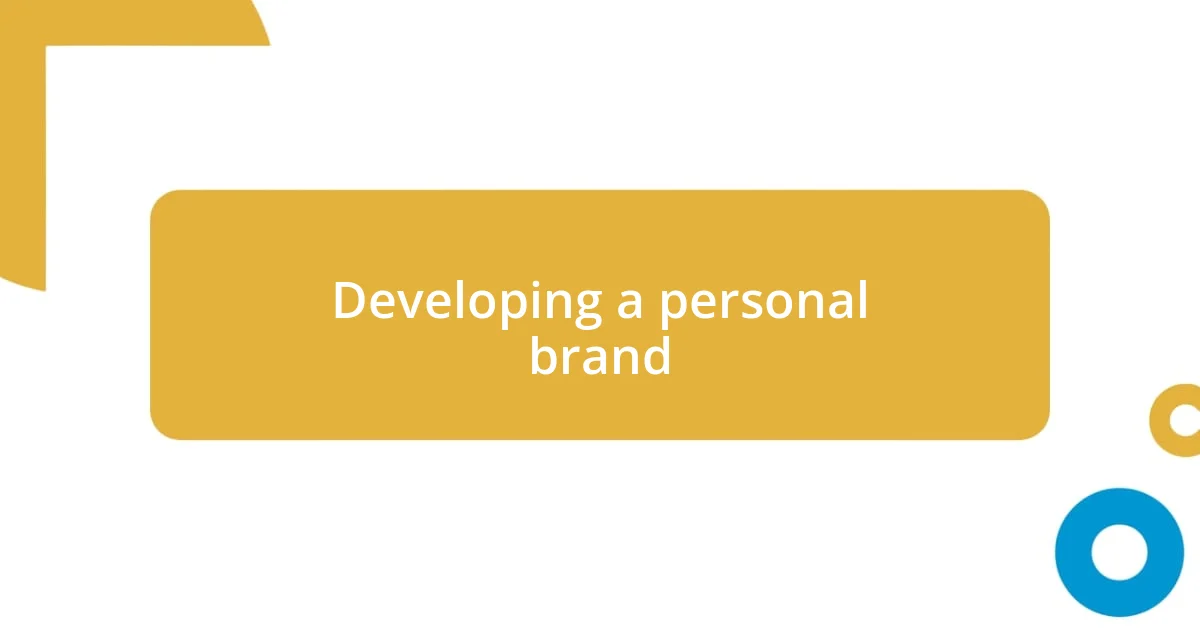
Developing a personal brand
Developing a personal brand is a journey of self-discovery and expression. I vividly remember crafting my elevator pitch for the first time; it felt like I was summarizing years of experience and aspirations into just a few sentences. This process taught me that your personal brand is essentially the narrative you create about yourself—it’s how others perceive you. So, how do you want to be seen? That’s the key question to ask yourself.
Authenticity has been my guiding principle in brand development. When I started sharing my professional journey on social media, I made it a point to be genuine and transparent about my struggles and triumphs. I once posted about my biggest challenge during a career shift and was surprised by the response. People reached out to share their own stories, which built a sense of community I never expected. Isn’t it invigorating to connect on a deeper level over shared experiences?
Visual elements also play a significant role in personal branding. I had a moment of clarity when I redesigned my résumé and online profiles to reflect my personality—from the colors to the language I used. It wasn’t just about being visually appealing but about being memorable. When I’ve interviewed candidates, I often recall those who stood out with their unique styles. How can you ensure your brand leaves a lasting impression? To me, it’s about consistency and character—making sure every piece of your narrative aligns with who you truly are.
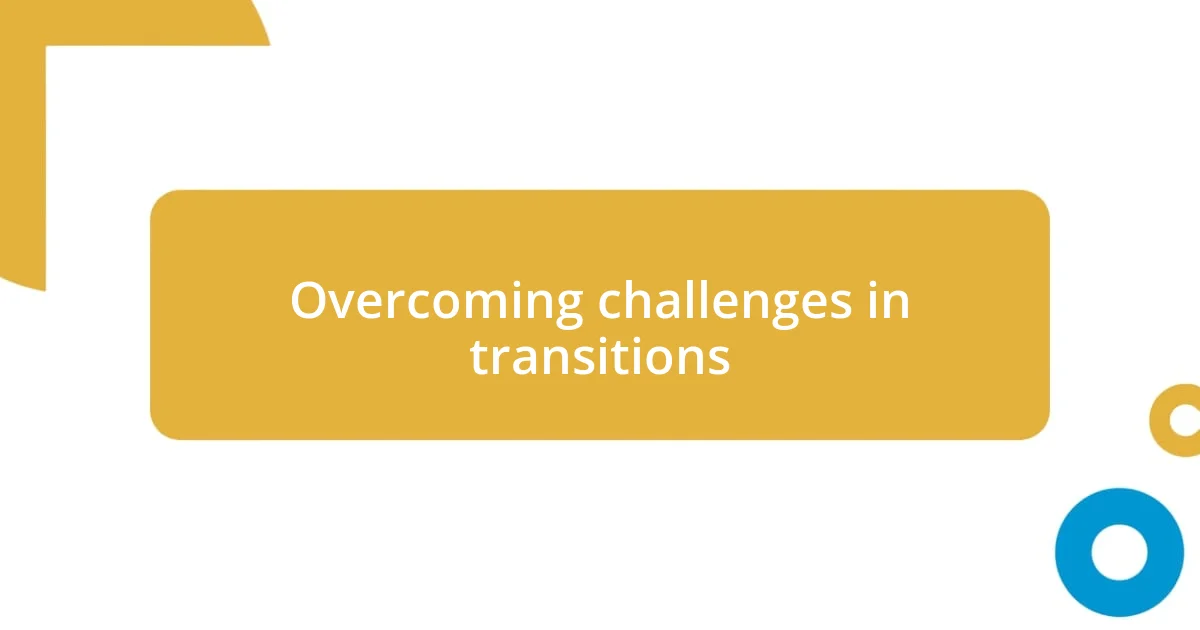
Overcoming challenges in transitions
Overcoming challenges during career transitions requires resilience and a positive mindset. I recall a particularly tough moment when I faced rejection after an interview that I had invested so much hope in. Rather than letting that setback define me, I took a step back to evaluate what I could learn from the experience. Have you ever turned disappointment into a stepping stone? It became clear to me that every closed door opened the possibility for a better opportunity, and that shift in perspective is what helped me keep moving forward.
Navigating uncertainty is another challenge that often accompanies transitions. There was a period when I felt lost, bombarded with choices that seemed overwhelming. I remember creating a simple pros and cons list for each option; this little exercise transformed chaos into clarity. Have you ever tried breaking down your options this way? It’s incredible how writing things out can unearth insights and help chart a more defined path—one that aligns with my true passions.
Lastly, the emotional rollercoaster of switching careers can’t be understated. During one particularly rough week, I found solace in joining a support group of individuals in similar positions. We shared our fears and victories, and I learned that vulnerability can be a strength. Have you ever experienced the power of community? It reminded me that I wasn’t alone in this journey; we were all navigating uncharted waters together, and that sense of solidarity was remarkably uplifting.
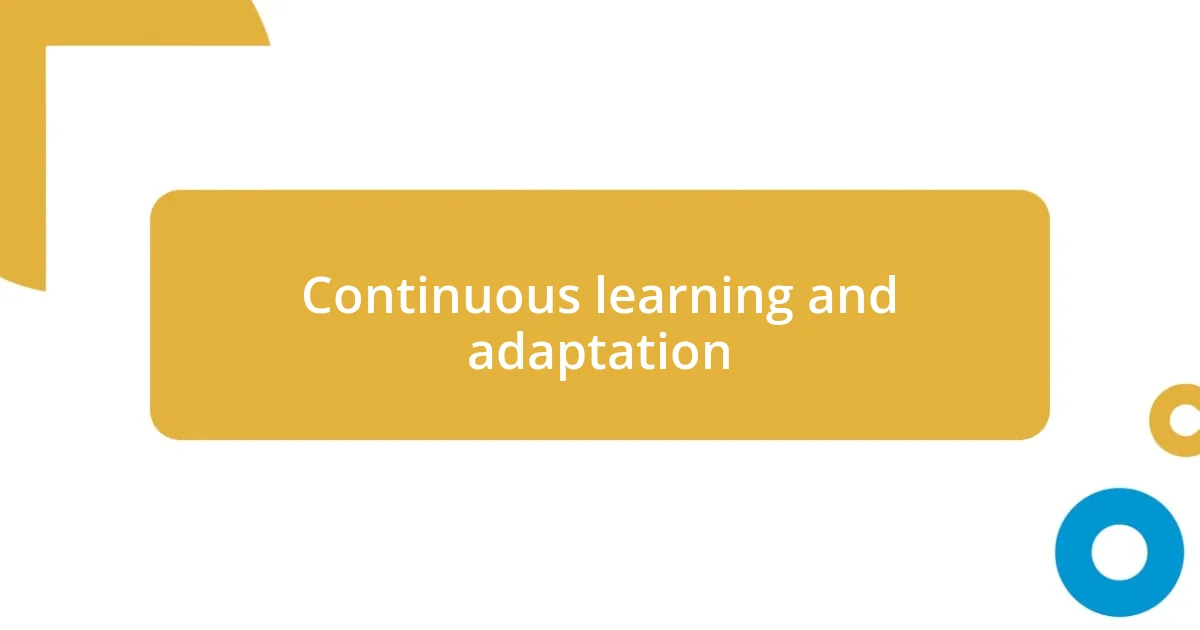
Continuous learning and adaptation
Continuous learning has been my compass during transitions. I once enrolled in an online course focused on digital marketing that I thought would simply enhance my skill set. To my surprise, it ignited a passion for brand storytelling that reshaped my career goals completely. Have you ever discovered a new interest that steered you in an unexpected direction? That experience taught me that staying curious can open doors I didn’t even know existed.
Adapting to new environments requires a mindset that embraces change. I remember starting a new position in a rapidly evolving tech company, where I quickly realized that what worked in my previous role no longer applied. Instead of clinging to old routines, I made it a point to connect with colleagues and absorb their approaches. Isn’t it amazing how much we can learn from the people around us? This adaptability not only sharpened my skills but also deepened my appreciation for diverse perspectives.
Another crucial aspect of continuous learning is reflection. After transitioning into a management role, I found myself overwhelmed and unsure. To cope, I began journaling my experiences and taking note of what strategies worked and what didn’t. This practice became a mirror, showing me where I needed to grow and adapt. Do you take the time to reflect on your daily experiences? I discovered that understanding my journey was just as vital as the skills I was acquiring, enabling me to embrace the evolution of my career with confidence.


